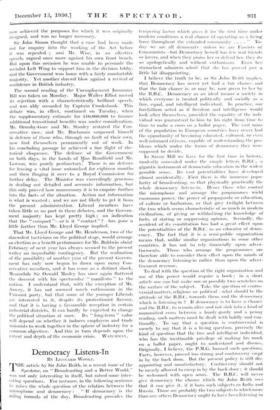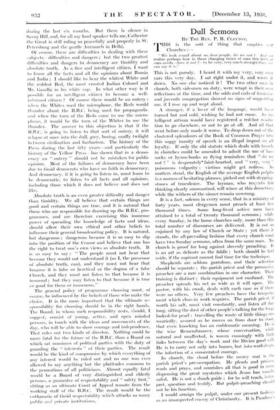Democracy Listens-In
Br LEONARD WOOLF.
THE article by Sir John Reith, in a recent issue of the Spectator, on "Broadcasting and a Better World." was not only interesting in itself, but raised some inter- esting questions. For instance, in the following sentence he raises the whole question of the relation between the
microphone and democracy " If democracy is the ruling formula of the day, Brhadeasting provides the tempering factor which gives it for the first time under modern conditions a real chance of operati [[ g as a living force throughout the extended vommunit v . . . " To- day we are all democrats—unless we are Fascists or Communists—but Democracy herself has few real friends or lovers, and when they praise her or (Vend her. they do so apologetically and without enthusiasm. Even her staunchest admirers admit, that site has proved just a little bit disappointing.
I believe the truth to be, as Sir John Ileith that Democracy has never yet had a fair chance. and that the fair chance is. or may be, now given to her by the B.B.C. Democracy as an ideal means a society in which everyone is treated politically and socially as a free, equal, and intelligent individual. In practice, our forefathers acted as if freedom and intelligence would look after themselves, provided the equality of the indi- vidual was guaranteed to him by his right from time to time to make a cross on a ballot paper. Th, NAISt IMISS of the population in European countries have never had the opportunity of becoming educated. cultured, or even well-informed citizens, capable of understanding the pro- blems which under the forms of democracy they were supposed to decide.
In Savoy llill we have for the first time in history, modestly concealed under the simple letters B.B.C., mc .gigantic instrument of demoerat le edneat ion in the widest possible sense. Its vast potentialities have developed almost accidentally. First there is the immense popu- larity of broadcasting, so that physically practically the whole democracy listens-in. Hence those who control the microphone and arrange the programmes wield enormous power, the power of propaganda or education, of culture or barbarism, or that grey I wilight between -the two which seems characteristic of so much in modern civilization, of giving or withholding the knowledge or facts, of stating or suppressing opinion. Seemally, the accident of its constitution hiss had it great effeet upon the potentialities of the B.B.C. as an educator of demo- cracy. The fact that it is a semi-public organization means that, unlike similar organizations in some other countries, it has not to rely financially uiioi u adver- tisements. Those who arrange the programmes are therefore able to consider their effect upon the minds of the democracy listening-in rather than upon the Aver- tisement revenue.
To deal with the question of the right organization 111111 use of this power would require a honk; in a short article one can but make one or possibly Iwo scratches on the surface of the subject. Take the question of contro- versiaImatters, religious or political —what should bc the attitude of the B.B.C. towards them and the democracy
which is listening-in If democracy is to have a chance and the B.B.C. to remain alive and not sink into a kind of mummified cross between a hurdy-gurdy and 4 penny reading, such matters must be dealt with boldly and con- tinually. To . say that a question is controversial is merely to say that it is a living question, precisely the kind of question that the free and intelligent individual, who has the inestimable privilege of making his mark on a ballot , paper, ought to understand and discuss. Originally, I believe, the P.M.G. banned such questions. Facts, however, proved too strong and controversy crept in by the back door. But the present policy is still dis- appointing and unsatisfactory. Controversy should not be merely allowed to creep in by the back door ; it should be welcomed with open arms. The B.B.C... will never give democracy the chance, which Sir John Rcith sees that it can give it, if it bans such subjects as India and Russia. Those are probably the two subjects to which more than any others Democracy ought to have been listening-in during the last six months. But there is silence in Savoy Hill, and, for all my loud speaker tells me, Catherine the Great is.still ruling so peacefully and properly in St. Petersburg and the gentle Aurunzeb in Delhi.
Of course, there are difficulties in dealing with these ialbjeets--- difficulties and dangers ; but the two greatest difficulties and dangers to democracy are timidity and absolute truth. . As a free and intelligent citizen, I want to know all the facts and all the opinions about Russia and India ; I should like to hear the whitest White and the reddest .Red, the most crusted Indian _Colonel. and Mr. Gandhi in his white cap.. In what other way is it possible for an intelligent citizen to become a well- informed citizen ? Of course there would be an outcry ; when the Whites used the microphone, the Beds would thunder about the B.B.C. being . used for propaganda, and when the turn of the Reds came to use the micro- phone, it would be the turn of the Whites to use the thunder. The answer to this objection is that if the 13.13.C. is going to listen to that sort of outcry, it will relapse at once into the dull, grey, boring, snuffy twilight latween civilization and barbarism. The history or the Press during the last fifty years—and particularly the history of the Yellow Press —has shown that in a demo- crat.). an " outcry " should not be mistaken for.publie opinion. Most of the failures of. democracy have been due to timid democrats who have no faith in democracy. And democracy, if it is going to listen- in, must learn to be democratic, to listen to all facts and all opinions, including those which it does not believe and does not I i ke.
Absolute truth is an even greater difficulty and danger than timidity. We all believe that certain things arc good and certain things are true, and it is natural that those who are responsible for drawing up the B.B.C. pro- grammes, and are therefore exercising this immense power of spreading the knowledge of facts and ideas, should allow their own ethical and. other beliefs to influence their general broadcasting policy. It is natural, but dangerous ; dangerous because it is so easy to slip into the position of the Censor and believe that one has he right to treat one's own views as absolute truth. It is so easy to say : " The people must not .hear- that because they would not understand it (as I, the possessor of absolute truth, can), and they must not hear that because it is false or heretical or the .dogma of a false Church, and they must not listen to that because it is immoral ; but they may listen. to that because it is true or good for them or innocuous."
• The general policy of programme choosing must, of course, be influenced by the beliefs of those who make the choice. It is the more important that the ultimate re- sponsibility for choosing should be in the right hands. The Board, in whom such responsibility rests, should, I suggest, consist of young. active, and open minded persons, in touch with the ideas and movements..of.the day. who will be able to show courage and independence. That rules out two kinds of director. Nothing could be more fatal for the future of the B.B.C. than a Board on which sat nominees of political parties with the duty of guarding the " interests " of their parties. The result would be the kind of compromise by which everything of any interest would be ruled out and no one was ever allowed to say anything but the platitudes common to the perorations of all politicians. Almost equally fatal would be a Board of very distinguished and elderly persons. a guarantee of respectability- and " safety first," sitting as an ultimate Court of Appeal remote from the working staff of the B.B.C. The result would be - the euthanasia of timid respectability which attacks so many pmmlmlie 11114I private institutions.















































 Previous page
Previous page